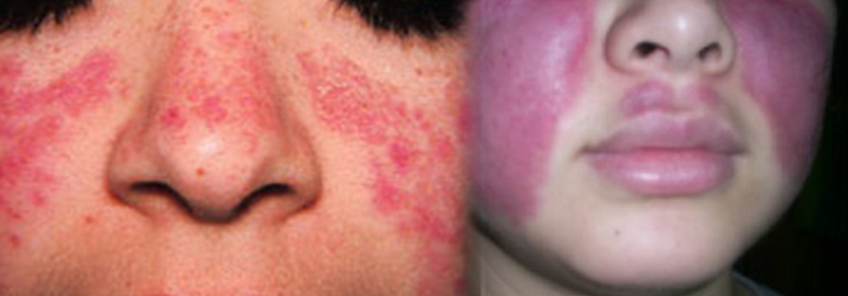
- Females of reproductive age;
- Estrogen containing contraceptives;
- Inherited genetic predisposition in up to 10% cases;
- Race – African American, Hispanic American and Asian have a higher chance of having an SLE;
- Certain drugs can also cause SLE. These include, Procainamide, Hydralazine, Isoniazid. Typically, this kind of SLE does not involve internal organs of the body.
- Fatigue;
- Joint pain;
- Fever;
- Rash-typically over nose and cheeks called ‘butterfly rash’, made worse by sunlight;
- Oral ulcers;
- Fingers or toes that turn blue when exposed to cold;
- Blood in urine;
- Chest pain;
- Difficulty breathing;
- Depression;
- Seizures;
- Psychosis.
- Almost all patients with SLE have a positive test for antinuclear antibody (ANA). However, positive ANA test alone is not sufficient to make the diagnosis of SLE. Several other antibodies are found in SLE.
- Complete blood count;
- Blood test to check kidney and liver function.
- For presence of protein and blood.
- When Lupus affects kidney.
- Based on organ(s) affected by Lupus.
- Nonsteroidal anti inflammatory drugs (NSAIDs);
- Antimalarials-Hydroxychloroquine;
- Topical steroids to skin or eyes;
- Systemic steroids – Prednisone;
- Immunosuppressive – Methotrexate, Mycophenolate, Cyclosporine;
- When kidneys are severely affected dialysis and kidney transplant is needed;
- In treatment-resistant lupus, monoclonal antibody and stem cell transplant may have role.
- Sun protection – sunglasses, sunscreen.
- Smoking cessation.
- Vaccination against influenza and pneumonia.
- Avoid contact with sick person.
- Treatment of associated conditions like hypertension or diabetes.
- Avoid pregnancy when disease is active to prevent pregnancy loss and disease flare up.
- Regular exercise.
- Vitamin D and calcium supplement.
Systemic lupus erythematosus (SLE) is a disease of immune system that can affect many organs in the body. Normally, the immune system produces proteins directed against infectious agents and protects us from infection. In SLE, however, your body produces antibodies that attack body’s own tissue and causes damage to the various organs.
Although the exact cause of SLE is not known, it is thought that some people are born with the a tendency to develop lupus that is triggered by a viral infection, chemical exposure or other unknown environmental factors. The disease can be mild or severe, and runs a chronic course with periods where the disease remains silent for some time and periods where many organs are affected and patient becomes very sick. Kidney involvement by lupus is a life threatening situation that may require dialysis and kidney transplantation. Lupus also increases risk of miscarriage.
Risk factors
SLE has some known risk factors. These include:
Symptoms
Symptoms depend on the organs involved. In early stages, the symptoms may be nonspecific, which sometimes can delay the diagnosis. Symptom severity fluctuates over periods with episodes of flare ups where symptoms are acute and severe. Some of the common symptoms are:
Severe and untreated SLE can cause many life-threatening complications, such as blood clots, multiple miscarriages, kidney failure, and heart diseases at early age. Treatment of lupus can also lead to increased risk of life-threatening infections.
Diagnosis
Diagnosis of lupus is difficult and is often delayed by many years. SLE is diagnosed by suggestive signs and symptoms and some of these supportive laboratory tests:
Blood Test:
Urine Test:
Kidney Biopsy:
Other Tests:
Treatment
There is no curative treatment for SLE at present. Treatment is aimed at suppressing the abnormally active immune system thereby preventing organ damage or provide symptomatic relief through medications. These medications have the potential for serious side effects including infection. So monitoring side effects is an important part of treatment. Commonly used medication groups to treat SLE are:
Prevention of complications
The following steps can be taken to prevent the complications from SLE:



Send us your feedback on this article